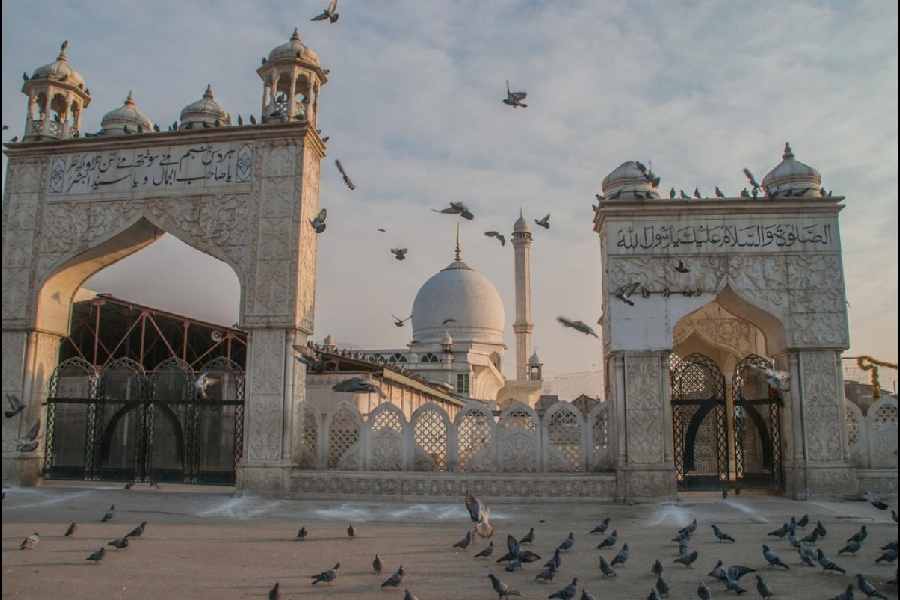Omar Abdullah was reportedly unable to access the main sanctum of the Hazratbal shrine this week after hurdles allegedly put up by the waqf board, helmed by a BJP leader.
This was the second time the Jammu and Kashmir chief minister had faced hurdles in entering a key erstwhile power centre of his party, the National Conference, in two months.
Unlike the July 14 episode at Srinagar’s Mazar-e-Shuhada, where Omar had to scale the fence after police had locked its gate, Thursday’s incident at Hazratbal unfolded quietly away from the public glare, eyewitnesses told The Telegraph.
Omar had to content himself with merely peering through the glass to get a glimpse of the “under-construction” sanctum at Hazratbal, the most revered Muslim shrine in Jammu and Kashmir.
Mazar-e-Shuhada, or the martyrs’ graveyard, and Hazratbal were regarded as key power centres of the NC before the 2019 scrapping of Jammu and Kashmir’s special status.
The party apparently did not make an issue out of it this time, underscoring Omar’s waning clout.
The new Hazratbal shrine was built by Omar’s grandfather, Sheikh Mohammad Abdullah, after a century-old mosque at the site, which houses a relic attributed to Prophet Mohammad, was demolished to be built afresh.
Omar on Thursday visited the shrine to chair a high-level meeting to review the arrangements being put in place for the ongoing Eid-e-Milad-un-Nabi festival, marking the birth anniversary of the Prophet.
“He had to return without entering the main hall,” an eyewitness said. An NC leader confirmed the development.
Officials said the shrine was getting a major facelift for the last eight months and the main hall — where prayers were held and the Prophet’s relic displayed on special occasions before renovations — has been out of bounds for devotees. Daily prayers are currently held in a side hall.
“Ply-sheets have been erected to block the view of the main shrine to prevent people from even catching a glimpse or clicking pictures as the waqf board is planning a big inauguration,” a waqf board official said.
Eyewitnesses said Omar, accompanied by senior officers, was received by waqf chairperson Dararkshan Andrabi, a BJP leader, on Thursday.
“Omar sahab entered the shrine through the VIP gate, where Andrabi presented a bouquet to him. He wanted to enter the main hall of the shrine but was politely told by Andrabi that it would be inaugurated in a few days and nobody was allowed in,” he said.
“Omar sahab asked how labourers were getting in. He did not make an issue of it and went downstairs to take a look around the shrine. He and a few others were allowed to pass through another gate towards the Dhobi Ghat side, but there again, ply-sheets were blocking the view of the main hall. Hazratbal MLA Salman Sagar removed the sheets, allowing Omar sahab and a few others to peer through the glass.”
The eyewitnesses said the NC leaders felt the ply-sheets were deliberately erected to prevent them from entering the main hall.
“The fact is they remain erect all the time, but Andrabi or her staff routinely enter the premises and face no restrictions,” an eyewitness said.
The newspaper called on Andrabi’s phone number, but an attendant said she was busy at some event.
Last year, the Andrabi-led waqf board ousted Hazratbal’s imam, Dr Kamal-ud-din Farooqui, for presiding over the public conversion of a Hindu man to Islam. Early this year, the man testified in court that he had converted to Islam out of his own will and without any force, but Farooqui has not been reinstated.
In July, the LG’s administration thwarted attempts by Kashmiri politicians to revive the commemoration of the July 13 Martyrs’ Day — when 22 Kashmiris were killed in 1931 protesting against Dogra rule — by placing them under house arrest and imposing restrictions to prevent a gathering at the Mazar-e-Shuhada, the graveyard in the old city.









